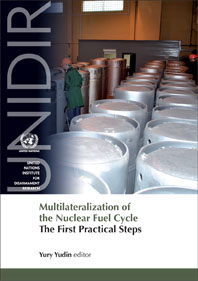From the outset of the nuclear age the international community has faced the following challenge: how to manage global nuclear fuel cycles to make the benefits of peaceful applications of nuclear technology available to all states, on an equitable and non-discriminatory basis while simultaneously reducing the risks of nuclear proliferation.
Whilst the dual-use nature of nuclear technology cannot be altered, something can be done to change how this technology is managed. More than once the world has considered multilateral management of the nuclear fuel cycle and multilateral mechanisms that would provide assurances of supply of the fuel for nuclear power reactors.
In recent years governments, the nuclear industry and non-governmental organizations have put forward many proposals regarding multilateral approaches to the nuclear fuel cycle and assurances of supply of low-enriched uranium and nuclear fuel. Of these, only a few projects have achieved significant momentum. The Russian Federation initiative to establish the International Uranium Enrichment Center and the guaranteed low-enriched uranium reserve have been implemented and are functional, and the International Atomic Energy Agency (IAEA) low-enriched uranium bank is in the early stages of implementation.
In-depth analysis of existing multilateral fuel-cycle mechanisms is essential for future implementation of multilateral fuel cycle projects. This book investigates the two operational Russian mechanisms and the incipient IAEA low-enriched uranium bank.
The first study, by Anton Khlopkov, outlines the key stages in the implementation of the Russian initiatives and details the steps undertaken to make them operational. The second study, by Zoryana Vovchok, discusses various legal issues pertaining to the choice of a state or states to host the future IAEA low-enriched uranium bank, which will be influenced by various political, economic and technical considerations.
Citation: Yury Yudin (ed.), Anton Khlopkov and Zoryana Vovchok (2011). "Multilateralization of the Nuclear Fuel Cycle: The First Practical Steps", UNIDIR, Geneva.
